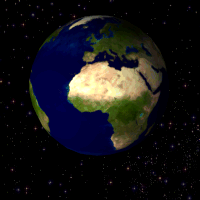Animated GIF

A rotating globe in GIF format.
|
|
| Filename extension | .gif |
|---|---|
| Internet media type | image/gif |
| Type code |
GIFf |
| Uniform Type Identifier (UTI) | com.compuserve.gif |
| Magic number |
GIF87a/GIF89a
|
| Developed by | CompuServe |
| Initial release | 1987 |
| Latest release |
89a
(1989) |
| Type of format | lossless bitmap image format |
| Website | www |
The Graphics Interchange Format (better known by its acronym GIF /ˈdʒɪf/ or /ˈɡɪf/ GHIF) is a bitmap image format that was developed by US-based software writer Steve Wilhite while working at the internet service provider CompuServe in 1987 and has since come into widespread usage on the World Wide Web due to its wide support and portability.
The format supports up to 8 bits per pixel for each image, allowing a single image to reference its own palette of up to 256 different colors chosen from the 24-bit RGB color space. It also supports animations and allows a separate palette of up to 256 colors for each frame. These palette limitations make the GIF format less suitable for reproducing color photographs and other images with continuous color, but it is well-suited for simpler images such as graphics or logos with solid areas of color.
GIF images are compressed using the Lempel–Ziv–Welch (LZW) lossless data compression technique to reduce the file size without degrading the visual quality. This compression technique was patented in 1985. Controversy over the licensing agreement between the software patent holder, Unisys, and CompuServe in 1994 spurred the development of the Portable Network Graphics (PNG) standard. By 2004 all the relevant patents had expired.
...
Wikipedia
